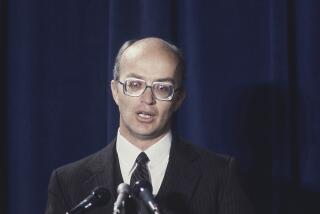William Attwood; Writer, Ambassador, Publisher
- Share via
William Attwood, writer, ambassador and publisher who in a four-decade career chronicled the Cold War as a reporter, worked for John F. Kennedy as a speech writer and held secret meetings with Fidel Castro as a diplomat, has died in New Canaan, Conn., at the age of 69.
Attwood, who died at home Friday of heart failure, was publisher of Newsday, the Long Island, N.Y., newspaper, from 1970 to 1978. He had served Presidents Kennedy and Lyndon B. Johnson as U.S. ambassador to Guinea and Kenya.
Born in Paris to American parents in 1919, Attwood majored in history at Princeton University and left Columbia Law School to enlist in the U.S. Army during World War II. After serving in the Middle East and the Pacific, he began his journalism career with the New York Herald Tribune. Attwood covered the United Nations and was a foreign correspondent. He later worked for the biweekly magazines Look and Collier’s and wrote a nationally syndicated column, “Dateline: Your World.”
As a foreign correspondent, Attwood observed the postwar drama of the Cold War and detente. He visited more than 70 countries on four continents, interviewing such leaders as Gamal Abdel Nasser of Egypt, Jawaharlal Nehru of India, David Ben-Gurion of Israel and Josip Broz Tito of Yugoslavia. In 1953, he spent five months traveling the world with Adlai Stevenson, then governor of Illinois, who had lost his bid for the presidency the year before.
‘Acute Observer’
Associates said Attwood took part in major events with a personal style of calm simplicity that carried over into his writing style.
In a review of one of Attwood’s books, “The Twilight Struggle: Tales of the Cold War,” published in 1987, a Times reviewer described Attwood as an acute observer and analyst who was, in part, a maker of the history of his time as well as a reporter of it.
“Attwood is the correspondent as diplomat,” wrote reviewer Rick Hertzberg, a senior associate of the Joan Shorenstein Barone Center on the Press, Politics and Public Policy at Harvard University. “He is patrician, reflective, urbane. . . . He is as comfortable in the salons of intellectuals and the reception rooms of ministries as he is in the hotel bar with the boys--maybe more so.”
Attwood successfully moved from the correspondent’s world to that of the politicians and diplomats he felt at ease with. In 1960, he served as a speech writer for Kennedy and in 1961 was named ambassador to Guinea. Later, as a member of Stevenson’s ambassadorial staff at the United Nations, Attwood flew secretly to Cuba in 1963 to meet with Fidel Castro in a vain attempt to negotiate a reconciliation between the two countries. He later served as ambassador to Kenya for Johnson.
After his diplomatic career, Attwood returned to journalism. In 1966, he became editor-in-chief, vice president and director of Cowles Communications, publishers of Look magazine. He joined Newsday as president and publisher in 1970 after it became part of Times Mirror, publisher of The Times.
Newsday Publisher Robert M. Johnson said Attwood applied his knowledge of the world and his “incredibly inquisitive mind” to lead the newspaper through major transitions, including the addition of a Sunday edition and the initial drive for circulation in New York City.
Newsday Contribution
“He was the one person that translated us from kind of a sleepy suburban newspaper to a world-class paper,” Johnson said in Newsday.
Attwood took pride in knowing almost everyone at Newsday, often while in the cafeteria inviting staff members to have lunch or a cup of coffee with him. He was named chairman of the newspaper’s board in 1978. He retired in 1979 but continued his writing career.
Attwood and his wife, Simone, were among three American journalist-couples admitted to China in the spring of 1971. Of the country and its leader, Mao Tse-tung, he wrote in Newsday:
“Modern China is essentially a vast, well-managed experimental penitentiary dominated by a benevolent but egocentric old warden who has given the inmates dignity, pride, security and a sense of unity and dedication. Since most of them had lost everything, even self-respect, their gratitude to the warden is genuine and sincere.”
He was author or co-author of several books, including “Making it Through Middle Age: Notes While in Transit.” The book, published in 1982, contained a certain fatalism: “And, to tell the truth, I don’t particularly want to see the 21st Century. I can’t perceive any dramatic progress in the offing, except in technology, and computers aren’t my bag.”
Besides his wife, Attwood is survived by a son, two daughters and three grandchildren. A memorial service is scheduled for Tuesday in New Canaan.
More to Read
Sign up for our Book Club newsletter
Get the latest news, events and more from the Los Angeles Times Book Club, and help us get L.A. reading and talking.
You may occasionally receive promotional content from the Los Angeles Times.









